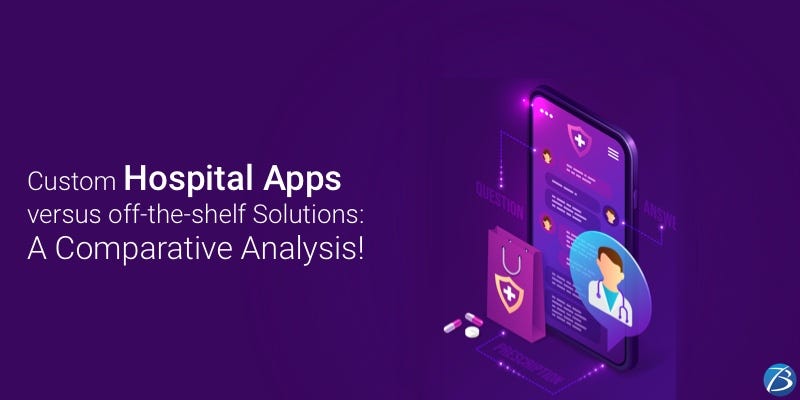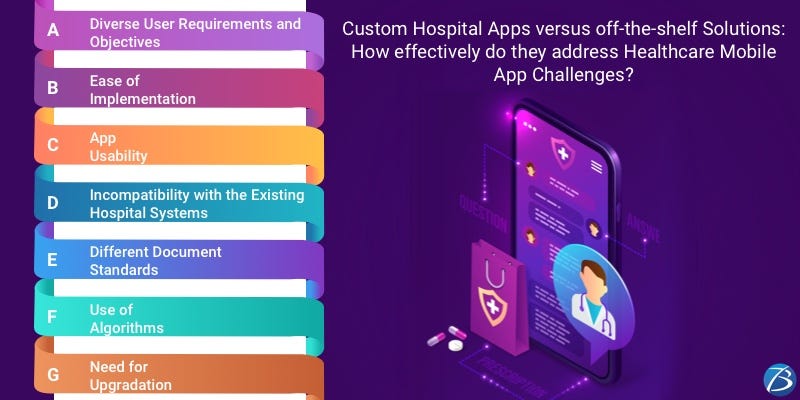ALL >> Health >> View Article
Custom Hospital Apps Versus Off-the-shelf Solutions: How Effectively Do They Address Healthcare Mobile App Challenges?

Today, several healthcare facilities are leveraging the power of technologically advanced Healthcare mobile solutions to address a wide range of challenges that adversely affect their efficiency and customer services. However, healthcare mobility solutions should be chosen carefully as the medical industry happens to be one of the most sensitive domains and one single error can lead to dire repercussions.
Hospitals/medical bodies planning to digitalize their operations, may choose between these two major categories of Healthcare app software – commercial off-the-shelf healthcare software and custom-made hospital app solutions. Both of these software categories come with their own set of benefits and drawbacks. Hence, it becomes difficult for healthcare providers to pick the right one that will fulfill the requirements of their medical facility and successfully resolve the existing roadblocks.
This post provides insights on the advantages and disadvantages of both approaches as well ...
... as the effectiveness of each type of software solution in handling the challenges encountered by the providers who adopt healthcare mobile app solutions.
Custom Hospital apps vs. off-the-shelf products: A Comparison
Off-the-shelf Medical App Solutions
Off-the-shelf medical app solutions refer to the commercial software products that are designed to meet the general market requirements of the healthcare sector. In other words, off-the-shelf healthcare app development provides the simplest and most universal solutions that cater to the broadest list of requirements.
Advantage
• Easy to implement
• Require low initial investment
Disadvantage
• Fail to satisfy specific or complicated business requirements
• Available for competitors as well
• Customization abilities regarding functionality and branding, range from moderate to nil.
• Incur high expenses in due course
Inference: Off-the-shelf healthcare products work best for carrying out standard tasks and less sensitive operations such as appointment scheduling, ePrescriptions, recording therapy, etc. It is also ideal for a low resource/low budget hospital setup, only if there are no chances of expansion in the near future.
Custom Healthcare App Solutions
Custom hospital app solutions are personalized products architected by Healthcare App development companies tailored to satisfy particular requirements and specifications of clients.
Advantage
• Tailor-made to befit specific requirements of a medical entity
• Offer more room for customization other than the specific features desired by clients.
• Highly scalable and flexible
• More resistant to security breaches
• Yields long-term cost savings
• Comes with support and maintenance facilities post product launch
• Promotes business growth
Disadvantage
• Consume more time as well as efforts to develop and implement
• Involve greater initial investment as compared to off-the-shelf counterparts
Inference: These solutions are ideal for large-scale medical bodies with complex, unique, and sensitive needs, with a future possibility of growth or expansion.
Off-the-shelf Products vs. Custom Hospital apps: How effectively do they address Healthcare Challenges?

Take a look at the healthcare app challenges and learn how effectively each approach addresses this challenge.
Challenge # 1: Diverse User Requirements and Objectives
The users of hospital app solutions, unlike those of lifestyle apps, have diverse requirements that depend on the medical category an app is meant for. The objectives of healthcare software catering to various specializations are often different from one another; even if the medical professionals of these specialties work in unison and cater to the same set of patients. For instance, a nurse may have to load the most recent lab test results in the system; while a practitioner may have to show these outcomes to patients and even compare these reports to the previous lab results in a graphical format. And, your Healthcare software system should satisfy such prerequisites.
The developers of off-the-shelf solutions do not integrate such specific functions as this may unnecessarily overload the app’s functionalities, complicate things for general users, and eventually narrow down their targeted audience.
Custom app developers, on the other hand, thoroughly analyze their clients’ business objectives by gathering data on their workflow and identifying the specific goals and needs of a particular group of would-be users. Thus, they are able to figure out every necessary feature or scenario and implement these within the proposed application. As a result, the tailor-made end-product is not only useful and flexible but also easy to comprehend and navigate.
Challenge # 2: Ease of Implementation
Despite the availability of adept software developers proficient in various programming techniques and developer-friendly technologies; implementing software solutions into a hospital body/ medical organization is not a cakewalk. And, developers have to face several hurdles for seamless implementation.
With off-the-shelf products, there isn’t any need to undergo a lengthy and complex implementation process owing to the previous experiences of these readymade solutions. Since most functions are tried and tested, execution becomes quite easy.
Implementing customized products is an uphill task. But, medical solutions that are built using the latest and highly advanced engagement/project execution models simplify the rolling out process and minimize or even zero down the chances of any issues.
Challenge # 3: App Usability
Most off-the-shelf software creators build either multi-purpose apps or solutions that cater to only certain medical requirements. This is because their prime objective is to make their solution attractive and target the maximum number of users possible. So, all the features offered by off-the-shelf solutions may not be useful and some of its modular components may unnecessarily disrupt the normal functioning of the healthcare system of a facility. Furthermore, owing to the limited features of such solutions, several specialists may not find a certain feature they require for a specific case. During such situations, a generalized solution seems useless.
Customization, contrarily, enables fulfilling the unique needs of healthcare specialists and offers the best possible solution. Custom apps are developed as per the needs of the hospital as well as the medical staff and hence, all features are necessary and useful.
Challenge # 4: Incompatibility with the Existing Hospital Systems
A hospital app, when installed, must be compatible with its in-house healthcare systems and existing software devices/systems like EHR systems. This is because if all systems and solutions do not work synchronously, the transfer of information would be erratic and the correct data wouldn’t get updated.
Seamlessly integrating two or more systems/devices with software mobility solutions will be effortless only if they are developed by the same vendor. The reason is each solution created by a different firm has its own set of security measures that hinder syncing with other solutions. Therefore, setting up data exchange becomes challenging or even impossible if all systems are not acquired from the same provider. Although a particular standard known as HL7 (Health Level 7) is universally adopted by medical app solution developers, the discreet nature of some software solutions can undermine this.
For this reason, it’s least likely that a readymade solution will function seamlessly with a hospital’s existing setup unless it is manufactured by the same app development company.
On the contrary, a custom-made solution will be developed keeping in mind the integrations needed. So, whether your in-house healthcare software system is a third-party solution, an off-the-shelf product, or a personalized solution from a different vendor; your custom app service provider will ensure that the new tailor-made product seamlessly integrates and communicates with all the existing medical devices/software systems.
Challenge # 5: Different Document Standards
The modern-era caregivers need to deal with loads of documents. And, the document standards differ as per the organization/region and also change with time. Ready-made solutions are unable to cope up with these standards as they offer limited templates that cater to generalized requirements.
When customized apps are designed for a particular medical entity or a specific department, developers are aware of the fixed number of document categories. Hence, creating templates for all relevant papers as well as implementing them within an app solution becomes easy. Moreover, the standard for all documents is meant for a specific facility and state/region. So, templates do not require extra editing whenever a medical professional needs to fill in it.
Challenge # 6: Use of Algorithms
It’s the latest trend to integrate special algorithms in healthcare app solutions for analyzing data. This approach helps in suggesting medication needed on the basis of an established diagnosis or banning a certain medicine from prescriptions due to its incompatibility with other prescribed medication or patients’ allergy to it.
However, algorithm integration doesn’t function well in the case of off-the-shelf products since an infinite amount of data needs to be processed leading to erratic outcomes.
Custom-made apps involve handling limited and more specific data and so, the predictions made by algorithms are far more accurate in comparison to ready-made solutions.
The Need for Upgradation
Off-the-shelf products mostly offer regular updates, but there are high chances of misses at times. This irregularity in providing up gradations often has an adverse impact on business organizations. However, customized software solutions address this issue successfully. These products are maintained and managed by the software firm that has crafted the solution and hence guarantees regular up gradation and even modification as and when needed.
Final Words:
The custom approach is preferred by medical facilities as they ease out the workflow and provide a competitive advantage. Yet, several enterprises ditch the custom approach and settle for off-the-shelf software solutions to reduce investment expenses, and end up facing certain roadblocks such as uncertainty, security risks, non-alignment of business objectives with the available software features, and many more. So, a tailor-made customized solution would be the perfect pick for your healthcare organization. Even a hybrid approach, a combination of custom solutions and ready-made solutions - may prove beneficial if implemented flawlessly.
All you need to do is partner with skilled healthcare app development services to obtain the desired software integration for your hospital body.
To know more about our core technologies, refer to links below:
Add Comment
Health Articles
1. Which Type Of Fruits Increase Sperm Count?Author: Surrogacy Centre India
2. How To Use Paragard Allwormer For Dogs And Cats?
Author: VetSupply
3. 5 Steps To Increase The Longevity Of Your Dental Implants
Author: Shallowford Dental Studio of Roswell
4. What To Expect During An Eye Exam In Tucson
Author: Catalina Eye Care
5. Understanding Epilepsy: Symptoms, Causes, And Effective Treatment Options
Author: lisa miracle
6. Level 5 Care Management
Author: Accessskills
7. Can Teeth Straightening Lead To Gum Problems Like Recession?
Author: Ryan Daniel
8. Everything You Need To Know About Dental Implants: A Comprehensive Guide
Author: Dr. Nimit Garg
9. Probiotics Supplement Manufacturers
Author: vakyaprob
10. Stay Active And Focused With The Best Energy Drink
Author: Yash
11. Infection Control In Healthcare: The Role Of Utopia-aire Isolation Rooms In Singapore
Author: Utopia Aire Pte Ltd
12. Discovering Top-quality Dental Care In Annerley: Your Guide To A Healthy Smile
Author: My implant dentist
13. Go For Dental Extraction If You Are Having Cavity Issues
Author: Pearl Dental Surgery
14. Skokie Dental – Smiles Made Simple
Author: Dr Tariq Hafeez
15. How To Prepare For A Successful Ivf Cycle?
Author: SCI IVF Hospital








